Summary 
Fascinating re-thinking of The Tempest is a visually delightful interpretation with Prospero a lonely old survivor acting like the director of an elaborate play, issuing commands to two young men who portray Ariel and Caliban, then use masks and puppets to represent the other characters from Shakespeare's story. Ingenious staging, emotionally expressive puppetry, evocative original music and some truly excellent performances in an interesting - if at times aloof, and at other times head-scratchingly opaque - entertainment.
Design
Directed by Jessica Thebus and Frank Maugeri. Adapted by Jessica Thebus. Designed by Frank Maugeri. Scenic Engineering by Neil Verplank. Co-Costume design by Sue Haas and Anna Glowacki. Lighting design by Andrew H. Meyers. Sound Design and Compositions by Jeffery Allen Thomas. Art Direction, 2D and Silhouette Puppetry Design by Andrea Everman. 3D Puppetry Design by Jesse Mooney-Bullock.
Cast
John Judd (Prospero), Samuel Taylor (Ariel), Adrian Danzig (Caliban), Sarah Addison Ely (Puppeteer), Dustin Valenta (Puppeteer).
Analysis
This fascinating co-production - a collaboration between Redmoon and Chicago Shakespeare Theater, co-directed by adapter Jessica Thebus and designer Frank Maugeri - features a planked cross that dominates the stage beneath looming chandeliers. Old-fashioned victrola phonographs with big yellow sound-horns are visible upstage, and the wooden cross can be seen as a waterfront pier, the decks of ships, or a performance stage, as well as a religious symbol of suffering.
Lights rise upon John Judd's world-weary Prospero - "dead of dullness" - wearing monkish brown robes over a black T-shirt, sporting the straggly white beard and hunched demeanor of a lonely old survivor. He tolls a heavy bell as if to announce a storm - or begin the production of a play - and is joined by two equally bedraggled but much younger men, the thinner and more ethereal he calls Ariel and the burlier, more earthy one Caliban. Judd's Prospero directs an elaborate play much like an impassioned and difficult-to-please maestro - "again! again!" - barking at his performers' attempts to recite lines, telling the story of his being usurped and marooned with Miranda, then the tempest and shipwreck he summons as vengeance, Ariel and Caliban playing all the parts. The Ariel character uses a long-haired and expressive mask to represent Miranda, affecting his voice and operating levers that move her lips and blink her wondering teenaged-girl eyes.
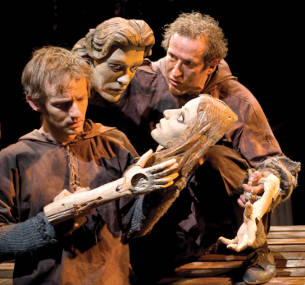
Prospero tosses the struggling actors treats as if to reward circus performance animals, then pulls mechanical levers to raise tiny but sharp-edged "waves" on the planks as lightning flashes and thunder roars, albeit sound effects played on the phonograph. The elaborate story-telling feels much less like a magician's spell than a staged recounting of a story, or more pointedly, the fantastic wishful thinking of a half-crazed old man. As the production progresses, it becomes increasingly apparent that there are truly no other survivors in Prospero's story other than these three grubby men, especially when Miranda and Ferdinand are represented only as masks, with one wooden hand each. Further, the actor playing Caliban dons a hideous but emotive mask on top of his head and begins scuttling crab-like across the stage...as himself, Prospero's imagined character Caliban.
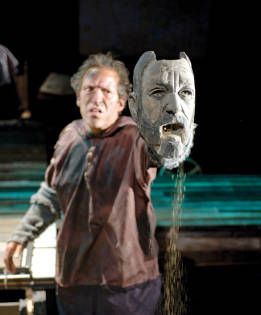
A tiny toy boat slides across the planks, and another pulled lever raises a center stage flower to signify the safety, dry land and colorful life of Prospero's island. The helper characters then pull masks from a drawer heavy with beach sand, the lifelike expressive faces representing a handsome wavy-haired young Ferdinand, a kindly Gonzalo, an angry-visaged Antonio, and a crowned King Alonso. Ariel and Caliban affect their voices and move about to astounding dramatic effect, the meticulously crafted masks certainly more artwork than puppetry. For the comic relief Stephano and Trinculo, the Ariel character uses two tiny hand puppets in a kind of whacked-out Punch and Judy routine. The puppets are equipped with hinged masks so with a flip of the wrist the puppets change from sad face to happy face. Perhaps just puppets held over an actor's head, but Samuel Taylor makes their voices distinctive and realistic and their movements spellbinding, such as Stephano knocking on the side of his head to clear his ears of seawater from the shipwreck.
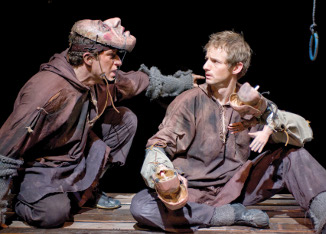
The appearance of Caliban is the highlight of the production, the mask atop the head of Adrian Danzig's head expressive - both evil and morose at the same time - and he seems crab or spider-like in his scuttling movements, dangerous and horrific. He leaps to a pole at stage left, kicks his feet off the wall like an island monkey, then dances to percussive drumming before spasming and falling to the stage in a fit. Caliban joins the drunken chant - "freedom! freedom!" - with Stephano and Trinculo before collapsing and passing out, his head in his arms like a child.
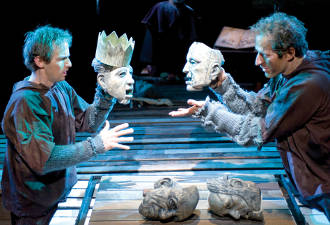
Judd's Prospero frequently consults a magical book behind him on a wooden easel, flipping pages as the story progresses, and his page-turning seems perfunctory, as if this is a tale he has told over and over again. After the testing of Ferdinand - the handsome mask dutifully above one puppet arm that cradles firewood logs - Prospero seems contented: church bells toll and he actually smiles, perhaps for the only time during the entire production, and white clouds become visible in blue skies over green grass upon a projection screen stage left. After Judd's Prospero places a garland over each mask in blessing, the two masks - Miranda and Ferdinand - share a gentle kiss and the projections show trees heavy with green leaves.
The story changes complexion violently - pun intended - as Prospero turns to the book to find only empty pages: "blank!" Judd's Prospero is essentially scriptless, suddenly ad-libbing on the fly - "I will plague them all!" - as Ariel and Cailban return in hooded robes. The two drunken would-be assassins quarrel with one another in an odd visual of a squatting actor with puppets on his upraised hands striking one another, before Danzig's hulking Caliban appears brandishing a wood-chopping axe: "do it!" But Judd's Prospero strikes first, a reflexive outburst of energy and shouting, the projection screen splattering red. The sense is that Prospero is lurching through the stages of grief: his denial and isolation passing to anger, with depression and finally acceptance looming ahead.
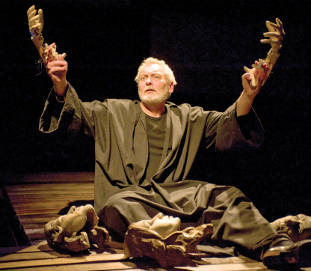
Thebus and Maugeri drive toward the same emotional climax as the triumph of forgiveness in Shakespeare's original version. With soft blue light shimmering like rippling water in near-darkness between the arms of the wooden cross, Judd's Prospero kneels sadly as if at the sea shore, addressing each mask individually with words of love and forgiveness. One by one Prospero releases each mask into the darkness where it bobs as if on the surface of water for a moment or two before slowly slipping down and away, a neat trick executed by a concealed puppeteer. Prospero physically releases - and emotionally frees himself from - each of the shipwreck survivors: "they shall be themselves," he says, perhaps acknowledging that they did not truly survive after all.
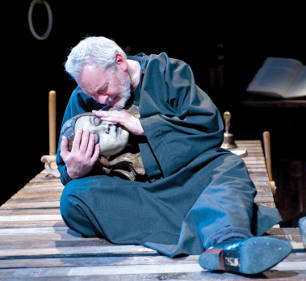
But Judd's Prospero lingers over the lovely mask of Miranda. The ache is palpable as Prospero looks at Miranda, then gently closes her eyes and caresses her hair before releasing her into the shimmering blue darkness. The brief production concludes after just seventy minutes with Judd's Prospero center stage, having accepted axe, scepter, and book from a scurrying Ariel. He grants both his acting servants their freedom - "I shall miss thee!" - before giving his closing words within a spotlight, ending an inventive and often spellbinding production.